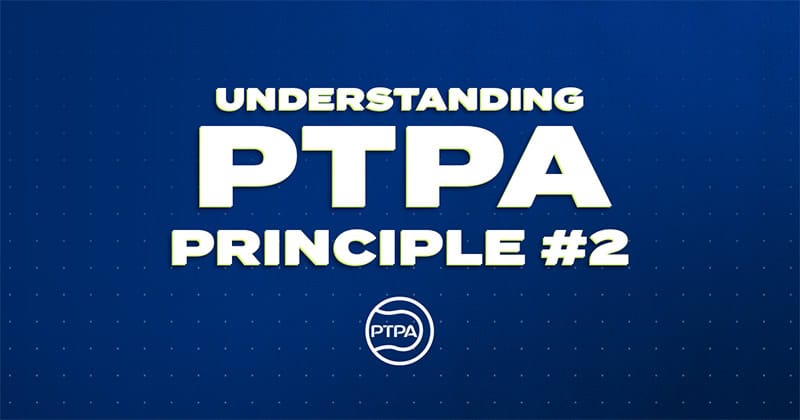
The second tenet of the PTPA Principles focuses on obtaining players’ fair share of the business of tennis and terms of participation through seven main avenues: shared success, employment opportunities, equitable compensation, new opportunities, pension and retirement, travel accommodations, and ticketing. Here’s a deeper look at what PTPA Principle tenet #2 means.
Principle 2a: Shared Success
Tennis players have the right to share fairly in the economic activity and wealth of tennis, which players have helped generate, underpinned by fair and just pay and work conditions.
Even though players are at the epicenter of the sport, they receive only 17.5% of the sport’s revenues in prize money – this is one of the lowest player revenue shares in all of sports. The lower revenue share, combined with players’ high out-of-pocket costs and lack of guaranteed income, results in an economic model that can only support a handful of tennis’ top names. All players should have their fair share of the wealth they help generate for the sport.
Principle 2b: Employment Opportunities
Professional tennis must offer pay and working conditions that allow more players to make a living playing professional tennis.
The costs associated with competing on tour often means that players aren’t just struggling to earn a comfortable living – they’re sometimes struggling to just break even. Tennis players have a right to earn a living while competing professionally, and must be better supported through pay and working conditions in order to do so.
Read here about the shocking financial reality of professional tennis:
Principle 2c: Equitable Compensation
Tennis players have the right to equitable, percentage- based player prize money, as well as annual player minimum compensation.
For the majority of the playing field, sustainable on-court earnings are extremely hard to come by. Athletes in other sports earn on-court money from things like signing bonuses and guaranteed minimum contracts, even if they don’t see much play time. In tennis, if you’re not consistently qualifying for tournaments and winning – or if you’re injured, ill, pregnant, or sidelined for any other reason – you’re not making money. Prize money is also pre-tax, and does not factor in players offsetting out-of-pocket costs associated with their travel and accommodations, support teams, and other needs.
PTPA Principle – Equitable Compensation
Principle 2d: New Opportunities
Tennis players must have access to more off-the-court opportunities to earn revenue.
An extension of the PTPA’s mission is to help generate more revenue for the players by introducing more off-court earning opportunities. One way the PTPA is helping provide additional off-court earnings to players is through its for-profit affiliate Winners Alliance. Winners Alliance will help negotiate group licensing and marketing opportunities on behalf of the collective brand value of PTPA players.
For example, in March, Winners Alliance announced its partnership with Fanatics Collectibles to provide professional women’s and men’s tennis players the opportunity to be included in a broad-scale group trading card set program through the company’s cornerstone brand, Topps. These collective, incremental revenue opportunities will help players have additional revenue streams to supplement their on-court earnings and any individual deals they have.
Read more on this first group licensing agreement in the history of professional tennis:
Fanatics and Winners Alliance Announce Exclusive Annualized Trading Cards Partnership for Professional Tennis Players
Principle 2e: Pension and Retirement
Tennis players must have the right to world-class pensions and benefits.
Professional tennis players are world-class athletes, and deserve to have access to world-class pensions, retirement plans, insurance policies and other benefits. While the hope is that all players have the opportunity to compete in long, healthy, successful careers, players must be given the opportunity to prepare for and protect themselves against changes to their career, such as an unexpected injury or transition into retirement.
Principle 2f: Travel and Accomadations
Tennis players should have easy access to a minimum standard of travel accommodations and logistics coordination in all official events.
The professional tennis tour lasts almost the entire year, taking players across countries and continents week in and week out. What many fans don’t realize is that most players coordinate and pay for their own travel, plus the travel of their coach and anyone else in their party. Traveling as a pro is a grueling, nonstop circuit around the world. Players should have access to travel support that alleviates the burdens associated with competing at official events worldwide year after year.
PTPA Principle – Travel And Accommodations
Principle 2g: Ticketing
Tennis players should have consistent and straightforward ticket access to events.
Often, players are forced to navigate different ticketing policies and request systems for each tournament in which they’re playing. Understanding and navigating player ticket policies should be a straightforward, consistent, low-friction process for players across all events.